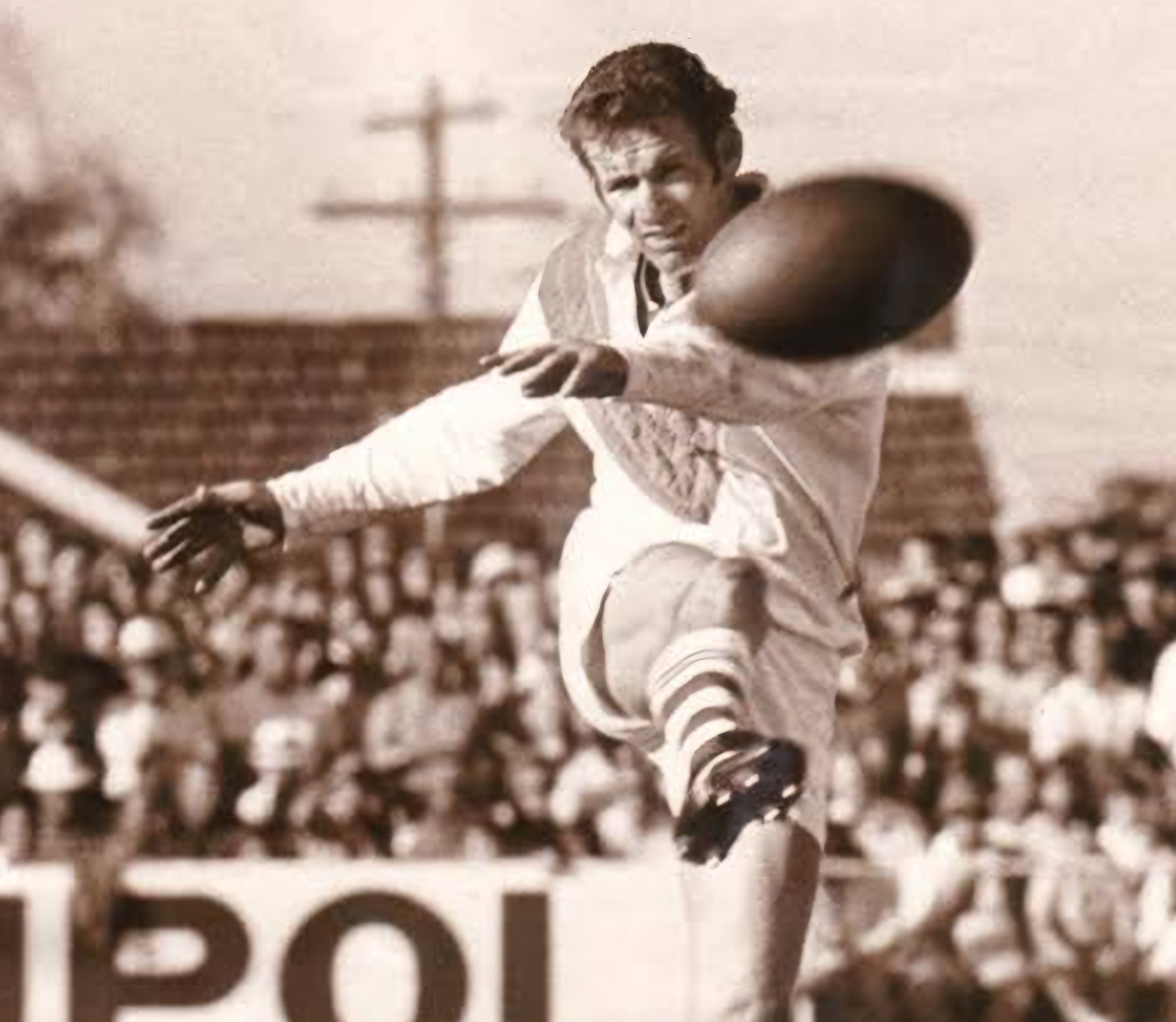GRAEME LANGLANDS
Graeme Frank Langlands MBE, also known by the nickname of "Changa", was an Australian professional rugby league footballer who played from the 1950s till the 1970s and coached in the 1970s. He retired as the most-capped player for the Australian national team with 45 international appearances from 1963 to 1975, and captained his country in 15 Test matches and World Cup games. Langlands was the fullback and goal-kicker for the St. George Dragons in the latter half of their 11-year consecutive premiership-winning run from 1956 to 1966.
Langlands was born in September 1941 in Wollongong, New South Wales, Australia. He had an unhappy childhood brought up by his alcoholic father.
Langlands represented Combined NSW High Schools from 1955 to 1957 and was playing 1st grade with the Wollongong Club in the Illawarra competition at age 18. The fullback got his first big break with selection for Country Firsts in 1962 following the withdrawal of Newcastle's Les Johns due to injury. That same year he made the first of a record 33 interstate matches for New South Wales over 14 seasons
With Billy Smith who also joined St George in 1963, Langlands added new firepower to the ageing Dragons champion line up, initially as Reg Gasnier's centre partner, but later moving to fullback. On field Langlands and Smith demonstrated a magical telepathy and an intuitive understanding of each other's kicking and positional game.
He made his Test debut as a centre against New Zealand at the Sydney Cricket Ground in 1963. The depth of the selectors' fullback options, including incumbents Ken Thornett then Les Johns, meant that Langlands spent the first four years of his Test career at centre. He excelled there and in the Ashes deciding 2nd Test against Great Britain on the 1963–64 Kangaroo Tour he scored an Anglo-Australian record of 20 individual points in the historic 50–12 "Swinton massacre". 1963 also saw the Kangaroos win The Ashes in England for the first time as solely an Australian team, starting a run from 1963 until the present where Australia hasn't lost a series on a Kangaroo Tour. Thereafter Langlands played international football for Australia every season for 13 seasons.
Langlands played in four St George Grand final winning sides, including 1966 where he kicked seven goals to beat Balmain. He was the competition's leading point scorer in season 1971 and season 1973. He was the Dragon's top point scorer in first grade in 10 seasons between 1963 and 1975. Later in the 1960s, and early 1970s St George got their best value out of Smith and Langlands when all of the stars of the long reign had gone. It was largely due to their combined class that the club remained competitive up until 1975.
He first captained Australia for the 1970 Ashes series and thereafter barring injury for the next five years. He was Captain-Coach for the 1972 World Cup series, the 1973 Kangaroo tour and the 1974 Test Series at home against Great Britain. In the deciding 3rd game in 1974, Langlands's final and most memorable of his 34 Test appearances, he played a magnificent match to win the Ashes, scoring a try and kicking five goals to take his career tally against Great Britain over the 100-point mark. Langlands last captained Australia in their undefeated four match campaign of the 1975 World Cup. He was the last Kangaroo selected in the dual Captain-Coach role. He also retired with the record of Australia's top point-scorer against Great Britain until surpassed by Mal Meninga in 1992.
On-field, Graeme could be hot-headed and petulant in his early career, though he matured into a fine leader. Fundamentally taciturn and introspective, he was not given to pre- or post-match speeches as captain but demonstrated an uncompromising leadership style via his will-to-win and a preparedness to be ruthless when required. He was a graceful, balanced runner of the ball, long-striding and fast. His trademark sidestep off either foot has become legendary in the Australian game. He would almost undetectably feint one way then make a 2m leap the other way at full speed taking him diagonally through a gap and into the clear.
During the final of the 1972 World Cup played between Australia and Great Britain at the Stade de Gerland in in Lyon, France, Langlands was involved in what many believe to be the "greatest try never scored". Australian halfback Dennis Ward put up a bomb about 45 metres from the Lions try line. Langlands gave chase and as the ball came down over the try line, he leaped into the air and caught it on the full and had seemingly scored a spectacular try. The French referee Georges Jameau disallowed it though, believing Langlands to be offside. Television replays however showed the Australian Captain-coach was approximately half a metre onside and that he had scored a fair try.
Langlands was awarded Life Membership of the St. George Dragons in 1973. He retired in 1976 at age 34 after 235 matches (all grades) for St George. Though regarded as having played one season too many, he finished his career as one of the most respected men to ever play the game. his retirement year he was awarded a Member of the Order of the British Empire, (MBE) medal for his contribution to Rugby League and club life.
In 1999 Langlands, and Queensland State of Origin legend lWally Lewis became the fifth & sixth selected post-war "Immortals" respectively of the Australian Rugby League, joining original Immortals Clive Churchill, Bob Fulton, Reg Gasnier, and Johnny Raper.
In February 2008, Langlands was named in the list of Australia's 100 Greatest Players (1908–2007) which was commissioned by the NRL and ARL to celebrate the code's centenary year in Australia. Langlands went on to be named as an interchange player in Australian rugby league's Team of the Century.
